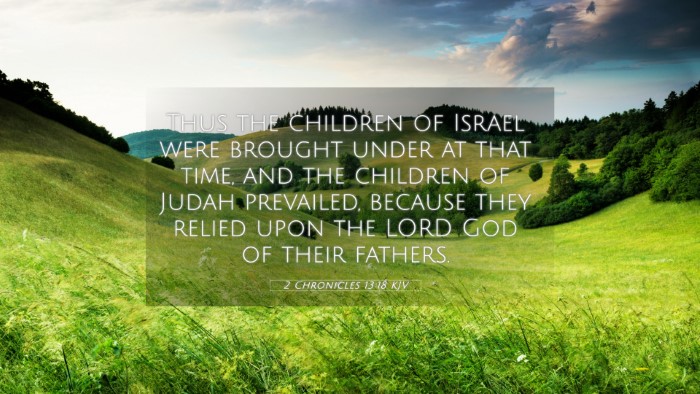Understanding 2 Chronicles 13:18
The verse 2 Chronicles 13:18 states: "Thus the children of Israel were brought under at that time, and the children of Judah prevailed because they relied upon the Lord God of their fathers." This passage reflects a significant moment in the narrative of the divided kingdoms of Israel and Judah, emphasizing reliance on God for victory in times of conflict.
Summary of Key Themes
- Divine Providence: The reliance on God is a central theme. It indicates that victory in battle is not merely by human strength but through divine support.
- Leadership and Faith: The verse highlights the importance of faithful leadership; Judah, under Abijah, exhibits trust in God which leads to their success.
- Consequences of Spiritual Alignment: The distinction between Israel and Judah reflects the broader spiritual implications of their respective alignments with God.
Commentary Insights
Commentators such as Matthew Henry emphasize that Abijah's faith was instrumental in expressing reliance on God's promises. He notes that victories are often attributed to the people's faithfulness to God rather than sheer military might. Albert Barnes points out the consequences of Israel’s defection from God as a key factor in their defeat. Meanwhile, Adam Clarke discusses the theological implications, stressing the need for authentic worship and covenant loyalty for divine favor.
Bible Verse Cross-References
Understanding 2 Chronicles 13:18 can be enriched by examining its cross-references in the Bible. Below are several verses that reinforce its themes:
- Psalm 44:6-7: "For I will not trust in my bow, neither shall my sword save me. But thou hast saved us from our enemies, and hast put them to shame that hated us."
- 2 Chronicles 20:15: "And he said, Hearken ye, all Judah, and ye inhabitants of Jerusalem, and thou King Jehoshaphat; thus saith the Lord unto you, Be not afraid nor dismayed by reason of this great multitude; for the battle is not yours, but God's."
- 1 Samuel 17:47: "And all this assembly shall know that the Lord saveth not with sword and spear: for the battle is the Lord's, and he will give you into our hands."
- Isaiah 31:1: "Woe to them that go down to Egypt for help; and stay on horses, and trust in chariots, because they are many; and in horsemen, because they are very strong; but they look not unto the Holy One of Israel, neither seek the Lord!"
- Hebrews 11:33-34: "Who through faith subdued kingdoms, wrought righteousness, obtained promises, stopped the mouths of lions, quenched the violence of fire, escaped the edge of the sword, out of weakness were made strong."
- Psalm 20:7: "Some trust in chariots, and some in horses: but we will remember the name of the Lord our God."
- James 4:10: "Humble yourselves in the sight of the Lord, and he shall lift you up."
Connections Between Bible Verses
The connections between 2 Chronicles 13:18 and the aforementioned verses illustrate the thematic continuity throughout Scripture regarding faith and divine intervention. The reliance on God during conflicts reveals a pattern found in the narratives of various leaders, such as David and Jehoshaphat, showcasing the efficacy of faith over military might.
Tools for Bible Cross-Referencing
For those interested in further exploring the interconnectivity of scripture, various tools and methods for Bible cross-referencing may be helpful:
- Bible Concordance: To locate specific verses linked to themes in 2 Chronicles 13:18.
- Bible Cross-Reference Guide: Provides explanations and connections between scriptures.
- Cross-reference Bible Study: A method for studying thematic connections through various passages.
- Bible Reference Resources: Compendiums offering detailed thematic analysis.
Conclusion
In summary, 2 Chronicles 13:18 serves as a powerful reminder of the importance of faith in God amidst adversity. The linkage to other verses throughout the Bible enriches our understanding and reinforces the overarching theme of reliance on divine providence. As one studies these connections, one gains deeper insights into God's unfailing support and the significant role of trust and obedience in the lives of His people.












